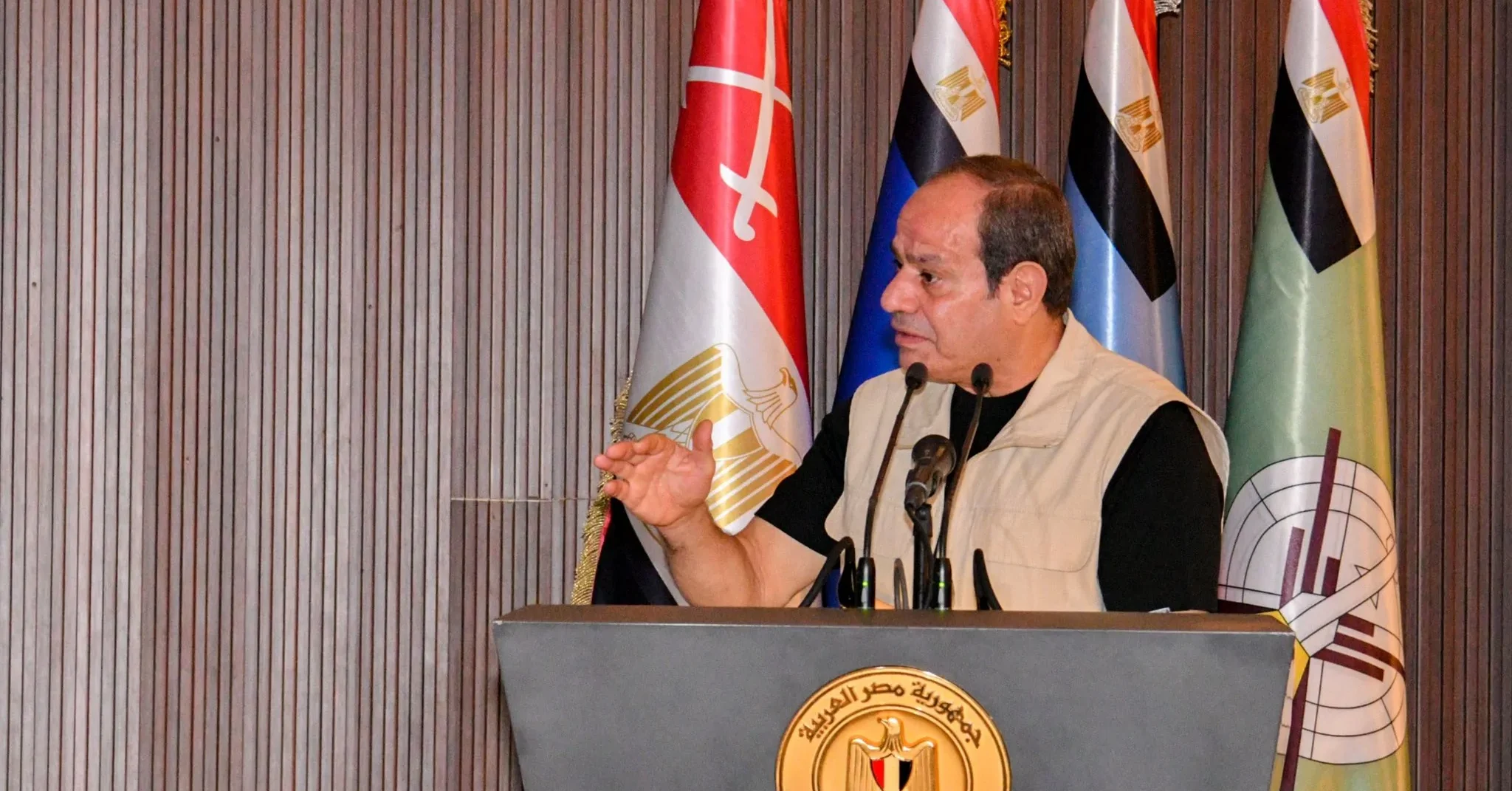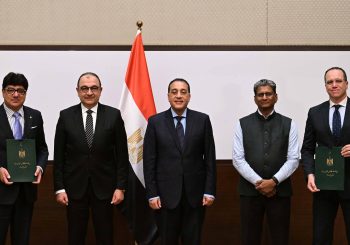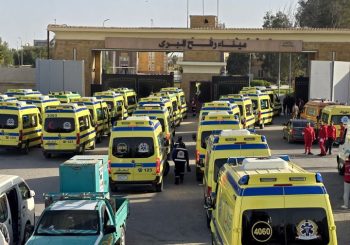Egyptian President Abdel Fattah Al-Sisi condemned recent attacks on Egyptian embassies abroad, saying they stem from “ignorance” as well as the “malice and deceit” of hostile groups.
Speaking at the Military Academy in the New Administrative Capital on Friday, 26 September, Al-Sisi stressed that “just because we are peaceful does not mean we accept any aggression or harm against Egypt.”
He stressed that Egypt harbors no plots against others, adding that the state has the resilience and capacity to defend its interests and national security against any threat.
He underlined the nation’s efforts to mediate in Gaza and provide humanitarian aid, rejecting claims that Egypt is obstructing assistance.
Al-Sisi’s remarks followed embassy protests by people in Europe and Israel, accusing Cairo of keeping the Rafah crossing closed.
After a summer of protests outside its embassies worldwide over Gaza, Egypt announced its plan to remove long-standing security barriers around foreign embassies in Cairo, reopening roads closed for 20 years.
Across the summer, protests took place outside Egyptian embassies in at least 16 countries, from Ireland, the United Kingdom (UK), South Africa, to Israel, as demonstrators urged Egypt to “break the siege” and open the Rafah crossing, a lifeline for aid into blockaded Gaza.
Among the countries where these demonstrations took place are the United States of America (USA), Sweden, Spain, Finland, the Netherlands, France, Germany, Turkey, and Libya.
Egypt rejected the accusations, calling them part of a “malicious propaganda campaign,” and responded with warnings to foreign governments and moves to reshape security measures around embassies in Egypt.
In light of what Egypt’s Foreign Ministry called inadequate security being offered by other countries at its embassies, Egypt removed security barriers outside the premises of the British Embassy in Cairo in Garden City on 31 August, south of Downtown, which had blocked traffic in the area since 2003.
On 7 September, Egypt’s foreign minister, Badr Abdelatty, announced, on the sidelines of the Maspero Cultural Salon at the National Media Authority, Ahram Online reported the plan to reopen every road previously closed around foreign embassies in Cairo “without exception.”
All barriers that have restricted pedestrian and vehicle access are set to be dismantled, though officials have not specified when the measure will take effect.
The announcement comes at a time of heightened international scrutiny, with tensions abroad reaching a peak in Europe, where protests over Egypt’s Gaza policy have grown increasingly confrontational.
When the Embassy Protests Started
The protests gathered momentum after an Egyptian activist symbolically chained the gate of Cairo’s embassy in the administrative capital of the Netherlands, The Hague, on 21 July.
Anas Habib, an Egyptian activist, led a demonstration where he locked the embassy’s doors shut with staff still inside, symbolizing Egypt’s alleged ongoing closure of the Rafah crossing with Gaza.
Dutch activists re-enacted the incident two days later and fastened the Egyptian embassy’s doors shut. On both occasions, police removed the locks and detained the demonstrators for a short time.
The disruptions prompted Egyptian President Abdel Fattah Al-Sisi to speak with Dutch Prime Minister Dick Schoof about the security of diplomatic missions and wider bilateral relations.
According to a statement released on 24 July by the Egyptian Foreign Ministry, the disruptions seek to misrepresent Egypt’s stance on the Palestinian cause, dismissing the accusations of obstructing humanitarian aid to Gaza, calling the claims baseless and inconsistent with Egypt’s policies and interests.
“The foreign ministry confirmed that Rafah has remained open from the Egyptian side. Israeli forces control the Palestinian side and block access,” the statement announced.
The Netherlands’ protest was one of many worldwide where protesters repeatedly gathered outside Egyptian embassies, blocking gates and staging sit-ins, accusing Egypt of driving Gaza toward famine, and demanding the crossing’s opening.
On 26 July, demonstrators assembled outside Egypt’s embassy in London, banging pots and pans to symbolize the hunger crisis in Gaza. They demanded that Egypt open the Rafah crossing, with one protester chanting, “Send in the aid. Stop starving the Gazans.”
In the administrative capital of South Africa, Pretoria, protesters scrawled insults about Egyptian President Abdel Fattah Al-Sisi across the embassy’s outer wall on 29 July.
Escalation in Europe and beyond
On 21 August, two brothers, Ali El Sammak, aged 22, and Yassin El Sammak, aged 15, participated in a protest in New York, U.S., and were pulled inside Egypt’s diplomatic mission to the United Nations and caught being held down by security staff on video.
The New York Police Department arrived shortly afterwards and arrested the two brothers. Ali was initially charged with a misdemeanor assault that was later dismissed, while Yassin still faces second-degree charges, including property damage, that could result in prison time.
During another protest in London on 25 August, the police arrested Egyptian Ahmed Abdel Qader during clashes between police and demonstrators outside the Egyptian embassy in London.
Qader is the head of the Egyptian Youth Union Abroad, a pro-government-backed nationalist group that supports Egypt’s stance on Gaza and organizes counter-demonstrations.
His arrest prompted a formal protest from the Egyptian government and the involvement of senior officials. Abdelatty allegedly phoned Britain’s national security adviser, Jonathan Powell, in late August seeking an explanation for Qader’s arrest.
According to the Egyptian Youth Union Abroad, the arrest of members of the union is “a shocking step that represents a flagrant violation of the most basic principles of justice, an assault on human rights, and a transgression of all rules of diplomatic relations and mutual respect between countries.”
Two days later, on 27 August, Qader was released without charge.
Egypt warns over embassy security
Egypt has called in several European ambassadors during August, criticizing what it described as “lapses in security“ at its embassies abroad and cautioned that foreign missions in Cairo might face similar treatment.
According to Abdelatty, protecting Egyptian embassies overseas was “non-negotiable” and signaled that Egypt would hold foreign embassies in Cairo to the same level of security.
In response to Qader’s detention, Abdelatty warned that Egypt reserves the “right to respond and reciprocity” toward countries that, in his view, fail to protect its embassies under the Vienna Convention. The warning signals a message that if London could not safeguard Egypt’s diplomatic presence, Cairo might reconsider the courtesies extended to Britain.
Egypt removes barriers around embassies
Egyptian authorities announced that the move followed complaints that the barriers obstructed traffic in the area and hampered residents’ ability to move in and out of Garden City.
On the same day, the British Embassy in Cairo announced that it had shut its main offices in Cairo.
In the UK’s Foreign Office statement, it declared that the building will remain closed “while the impact of these changes is reviewed.” Consular emergencies were handled by phone, and those with scheduled appointments were told to contact the embassy in advance for entry guidance.
The closure proved temporary, as on 2 September, the British Embassy reopened and resumed services after consultations with Egyptian authorities. However, the barriers were not reinstalled.
The embassy barriers, long associated with heightened security and restricted access, have become a focal point in ongoing diplomatic discussions.







Comments (0)